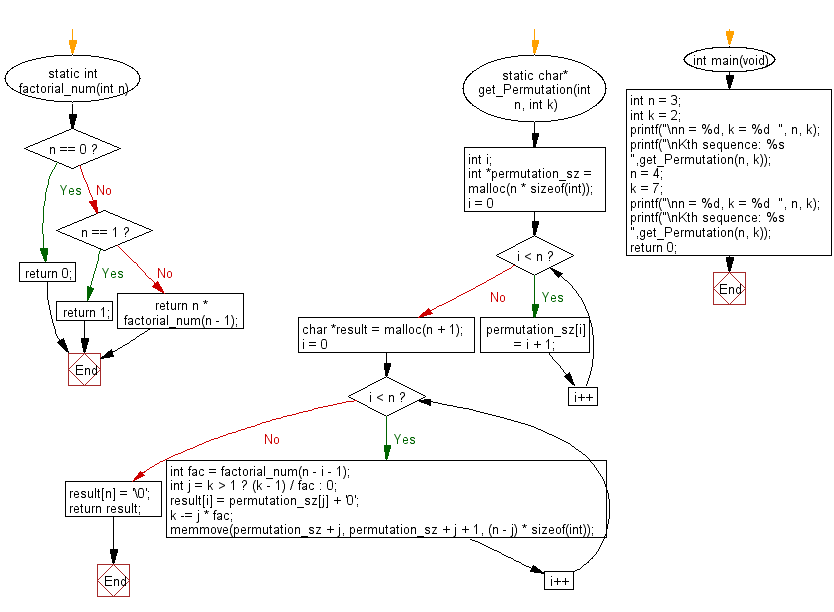C Exercises: Get the kth permutation sequence from two given integers n and k
5. Kth Permutation Sequence Variants
The following set contains a total of n! unique permutations
Set: [1, 2, 3, ..., n]
If n =3 we will get the following sequence:
1. "123"
2. "132"
3. "213"
4. "231"
5. "312"
6. "321"
Input: n = 3, k = 4
Output: "231"
Write a C program to get the kth permutation sequence from two given integers n and k. In these integers, n is between 1 and 9 inclusive. In addition, k is between 1 and n! Inclusive.
Example:
Input:
n = 3
int k = 2
n = 4
k = 7
Output:
Kth sequence: 132
Kth sequence: 2134
Sample Solution:
C Code:
#include <stdio.h>
#include <stdlib.h>
#include <string.h>
// Function to calculate factorial of a number
static int factorial_num(int n) {
if (n == 0) {
return 0;
} else if (n == 1) {
return 1;
} else {
return n * factorial_num(n - 1);
}
}
// Function to get the kth permutation sequence of size n
static char* get_Permutation(int n, int k) {
int i;
// Create an array to store permutation elements from 1 to n
int *permutation_sz = malloc(n * sizeof(int));
for (i = 0; i < n; i++) {
permutation_sz[i] = i + 1;
}
// Allocate memory to store the resulting permutation sequence
char *result = malloc(n + 1);
for (i = 0; i < n; i++) {
int fac = factorial_num(n - i - 1); // Calculate factorial of (n - i - 1)
// Calculate index for the current position in the permutation
int j = k > 1 ? (k - 1) / fac : 0;
// Get the permutation element at index j and store it in the result
result[i] = permutation_sz[j] + '0';
// Update k and adjust the permutation array
k -= j * fac;
memmove(permutation_sz + j, permutation_sz + j + 1, (n - j) * sizeof(int));
}
result[n] = '\0'; // Add null terminator to the resulting string
return result; // Return the resulting permutation sequence
}
int main(void)
{
// Test case 1
int n = 3;
int k = 2;
printf("\nn = %d, k = %d ", n, k);
printf("\nKth sequence: %s ", get_Permutation(n, k));
// Test case 2
n = 4;
k = 7;
printf("\nn = %d, k = %d ", n, k);
printf("\nKth sequence: %s ", get_Permutation(n, k));
return 0;
}
Sample Output:
n = 3, k = 2 Kth sequence: 132 n = 4, k = 7 Kth sequence: 2134
Flowchart:

For more Practice: Solve these Related Problems:
- Write a C program to generate the kth permutation sequence of numbers 1 to n using recursion and backtracking.
- Write a C program to calculate the kth permutation directly using factorial number system without generating all permutations.
- Write a C program to generate the kth lexicographic permutation with iterative swapping techniques.
- Write a C program to find the kth permutation sequence and validate it by comparing with the complete permutation list.
Go to:
PREV : Power Function Variants.
NEXT : Decimal Number String Check Variants.
C Programming Code Editor:
Improve this sample solution and post your code through Disqus.
What is the difficulty level of this exercise?
Test your Programming skills with w3resource's quiz.
